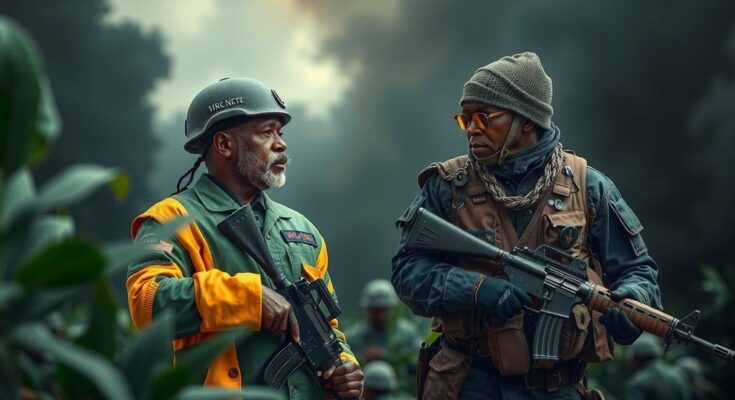Rwanda-backed M23 rebels are escalating offensives in eastern DR Congo despite a ceasefire agreement, leading to military clashes and territorial disputes. The Congolese military accuses Rwanda of exploiting the truce to gain control over localities. The ongoing conflict highlights longstanding tensions in the mineral-rich region.
Rwandan-backed rebels have intensified their advances in the eastern region of the Democratic Republic of Congo (DRC), as reported by local sources to AFP. The Congolese military has accused Rwanda of exploiting a ceasefire agreement to expand its territorial claims. The M23 rebel group, predominantly composed of ethnic Tutsis, launched a renewed offensive in late 2021, gaining control over significant areas in the eastern DRC and displacing thousands of civilians, thereby exacerbating a humanitarian crisis. Despite a truce established between Rwanda and the DRC in early August, the M23 has resumed aggressive actions in North Kivu province, targeting the vital loyalist town of Pinga. Congolese military officials assert that the armed forces are strictly adhering to the ceasefire, while accusing Rwanda of “taking advantage” of the situation for territorial control. Although the ceasefire has been largely observed by both national armies, various armed factions in the region have consistently breached the agreement. On October 23, the M23 took control of the contested town of Kalembe after engaging in combat with the Wazalendo, a coalition of militias allied with the Congolese army. Following this incident, the M23 has advanced further toward Pinga, a strategic location containing one of the region’s limited airstrips, prompting the Wazalendo to mobilize alongside Congolese forces to halt their progress. Military sources in Pinga confirmed ongoing confrontations, with no reported casualties as armed forces from the DRC reinforce their positions. The capture of Kalembe has drawn condemnation from Angola, the broker of the ceasefire, which characterized the M23’s actions as a “flagrant violation” of the truce. Additionally, France has expressed disapproval of the M23’s ongoing military offensives. The eastern DRC, rich in minerals, has suffered from a landscape of conflict and violence, both internal and from neighboring nations, for nearly thirty years.
The ongoing conflict in the eastern regions of the Democratic Republic of Congo primarily stems from complex ethnic tensions and competition over valuable mineral resources. The M23 rebel group, which has roots in past conflicts, has repeatedly emerged as a significant threat, often attributed to the backing of Rwanda. The international community’s efforts, including ceasefire agreements, have struggled against relentless cycles of violence, exacerbating the humanitarian crisis affecting millions of civilians in the region. The violations of ceasefire agreements and the activities of various armed groups contribute to the instability and perpetuation of conflict in a region already suffering from decades of unrest.
In summary, the situation in eastern DRC remains precarious as Rwandan-backed M23 rebels take advantage of a ceasefire to make territorial gains, leading to renewed violence and humanitarian issues. The Congolese military’s commitment to upholding the ceasefire contrasts sharply with accusations of Rwandan interference and the M23’s aggressive maneuvers. The ongoing turmoil underscores the enduring challenges faced by the DRC, with hopes for peace increasingly overshadowed by escalating conflict.
Original Source: www.barrons.com




